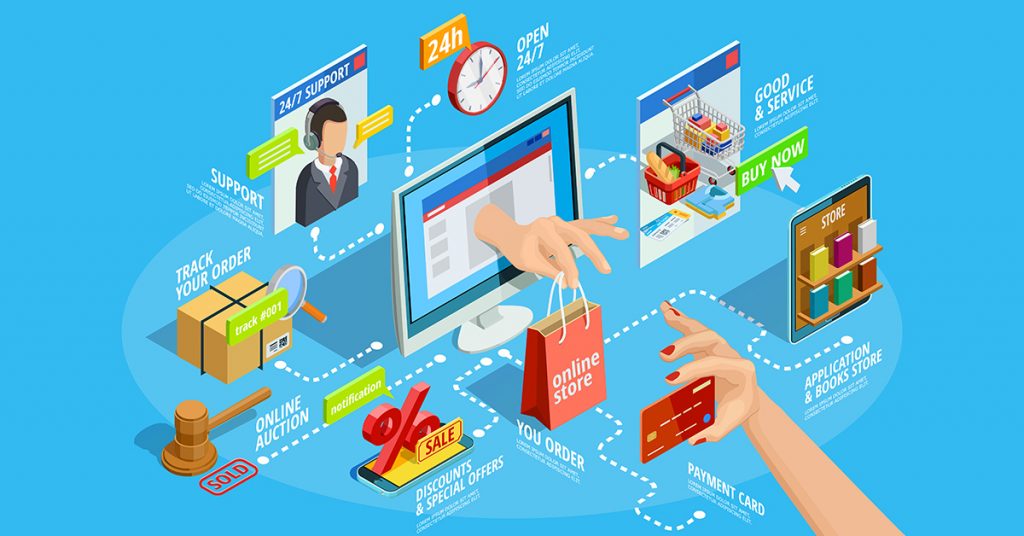
Innovative e-commerce firms have altered the way we buy today and redefined what can be achieved. E-commerce accounted for 6% of online transactions in the U.S. in 2013 and that was up to 9% by 2017. Experts estimate that e-commerce transactions will account for 14 percent of all purchases in the United States by 2021.
Today, for innovative entrepreneurs, it is simpler than ever to make their ideas a reality. Every year we see new firms dethroning monoliths “the way we’ve always done it.” Although many of the instruments are modern and are evolving fast, the rules have remained the same. You’ll need to know your business model and identify how you’ll innovate if you want to innovate and defy standards.
Intuition, industry awareness, a sound strategic strategy, and a thorough analysis of goods and business models are needed for a thriving e-commerce business. But it’s easy to overcome one of the greatest challenges most beginners encounter in space. Many would-be founders of e-commerce firms really don’t know how e-commerce companies are set up and what different forms of e-commerce are open to them.
In this post, we will speak about the main e-commerce market models, some examples of innovators, and the ideals of e-commerce creativity. You also need to emphasize the importance of an eCommerce web development company in India to foster your eCommerce presence.
Types of eCommerce Business Models
The B2C eCommerce Model
B2C firms market them to their end-users. The B2C model is the most popular business model, but under this umbrella, there are many specific approaches. As part of a B2C purchase, everything you buy as a customer in an online shop – consider wardrobe, kitchen products, entertainment – is done.
The B2C buying decision-making process is much shorter than a business-to-business (B2B) purchase, especially for products that have a lower valuation. Think about it it’s much simpler for you to settle on a new pair of tennis shoes than to vet and buy a new email service provider or food caterer for your company.
B2C online retailers target a diverse demographic and emphasize new marketing and distribution techniques such as advertising-based marketing, social media, and influencer marketing. An eCommerce web development company in India can help you in deploying a robust B2C eCommerce model.
To maximize traffic, facilitate campaigns, and sales conversions, B2C eCommerce company owners expend more time than exchanging quotations and terms or handling order production and fulfillment.
Usually, B2C firms expend less marketing money to make a deal because of this faster sales time, but they still have a lower total order size and fewer repeat orders than their B2B counterparts. An eCommerce web development company in India is crucial for ensuring a robust B2C business model.
The B2B Business Model
An organization offers the goods or services to another corporation through a B2B business model. The retailer is the end-user often but the dealer resells to the retailer sometimes. In general, B2B deals have a longer processing time, but the higher-order volume and more frequent acquisitions.
By replacing catalogs and order sheets with e-commerce storefronts and improving targeting in niche markets, recent B2B innovators have made a position for themselves. Nearly half of B2B customers are millennials in 2020, about twice the number in 2012.
Ecommerce business-to-business (B2B) defines online business-to-business transactions. Wholesalers, suppliers, and dealers are predominantly organizations participating in the B2B model. The global B2B e-commerce industry is expected to hit 6.7 trillion USD by 2020, despite not being the most popular form of e-commerce.
B2B sale in the online space is becoming more relevant as younger millennials reach the age of making company purchases. An eCommerce web development company in India is important for the success of a B2B eCommerce business model.
The C2B Business Model
C2B companies allow people to offer products and services to businesses. A website will encourage consumers to post the job they want to complete in this e-commerce model and have companies compete for the opportunity. It will also deem affiliate marketing platforms to be C2B.
In this model, Elance (now Upwork) was an early innovator, helping corporations recruit freelancers. The strategic edge of the C2B e-commerce model is in product and service pricing. An eCommerce web development company in India can help you in developing and deploying a robust C2B business model.
This tactic allows customers the right to name their premium or make firms bid directly to satisfy their specifications. Latest innovators have used this paradigm creatively to connect businesses to social media influencers to sell their goods.
The C2C Business Model
A C2C corporation, also known as an online marketplace, connects customers by charging purchases or listing payments to share products and services and usually making their money. An eCommerce web development company in India can help you in deploying a robust C2C business model for your eCommerce business.
Ecommerce companies from C2C promote customer purchases. Individuals can sell, purchase, and share products or services on C2C platforms. By charging listing and processing fees, consumer-to-consumer linking sites gain money. C2C works widely with a third-party firm to promote trades, protect customers, and manage quality management, unlike B2B and B2C.
In the early days of the internet, web companies like Craigslist and eBay pioneered this model. C2C companies benefit from empowered buyers’ and sellers’ self-propelled growth, but face a key challenge in quality management and retaining technology.
Conclusion
You’re able to get started now that you know what e-commerce firms, product options, channels, and market classifications exist. Take a look at your roadmap for the company. Just remember to opt for an eCommerce web development company in India to develop your eCommerce presence.
Regardless of what eCommerce business model you prefer, chances are that at some stage you will need outside capital to scale up your business. Funding strategies such as Payability specialize in eCommerce firms which provide both accelerated daily payouts when terms and capital advances dependent on potential eCommerce revenues are charged through markets.









